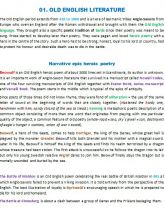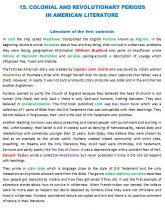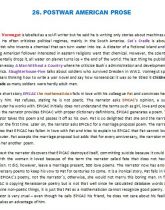Studijní materiál: Okruhy z anglické literatury
Skrýt detaily | Oblíbený- Kvalita:81,2 %
- Typ:Studijní materiál
- Univerzita:Masarykova univerzita
- Fakulta:Filozofická fakulta
- Kategorie:Jazyky
- Podkategorie:Zahraniční literatura
- Předmět:Anglická literatura
- Autor:katerina.loumova
- Rozsah A4:130 strán
- Zobrazeno:1 672 x
- Stažené:1 x
- Velikost:0,5 MB
- Formát a přípona:Archiv souborů (.rar)
- Jazyk:anglický
- ID projektu:8720
- Poslední úprava:26.09.2016
01. OLD ENGLISH LITERATURE
The Old English period extends from 410 to 1066 and is an era of Germanic tribes Anglo-Saxons from Europe who overran England after the Roman withdrawal and brought with them the Old English language. They brought also a specific poetic tradition of bards since their poetry was meant to be sung. Prose started to develop later than poetry. They were pagan and loved heroic poetry with a hero in the centre of the story. Such a hero had to be strong, honest, loyal to his lord or country, had to protect his honour and desirable death was to die in the battle.
Narrative epic heroic poetry
Beowulf is an Old English heroic poem of about 3000 lines set in Scandinavia, its author is unknown. It is an important work of Anglo-Saxon literature that survived in a manuscript called Nowell Codex, one of the four surviving manuscripts of Old English together with Exeter Book, Janius manuscript and Vercelli Book. The poem starts in the middle which is typical of the epics of antiquity.
Since poets of those times did not know rhyme, they were fond of alliteration = the use of the same letter of sound at the beginning of words that are closely together. (Hastened the hardy one, henchmen with him, sandy strand of the sea to tread.) Kenning is metaphoric poetic description of a common object consisting of more than one word that originates from playing with one particular quality of the object, a common feature of old poetry (whale-road = sea, sky´s jewel = sun, destroyers of eagle´s hunger = warriors, onion of war = sword).
The Old English period extends from 410 to 1066 and is an era of Germanic tribes Anglo-Saxons from Europe who overran England after the Roman withdrawal and brought with them the Old English language. They brought also a specific poetic tradition of bards since their poetry was meant to be sung. Prose started to develop later than poetry. They were pagan and loved heroic poetry with a hero in the centre of the story. Such a hero had to be strong, honest, loyal to his lord or country, had to protect his honour and desirable death was to die in the battle.
Narrative epic heroic poetry
Beowulf is an Old English heroic poem of about 3000 lines set in Scandinavia, its author is unknown. It is an important work of Anglo-Saxon literature that survived in a manuscript called Nowell Codex, one of the four surviving manuscripts of Old English together with Exeter Book, Janius manuscript and Vercelli Book. The poem starts in the middle which is typical of the epics of antiquity.
Since poets of those times did not know rhyme, they were fond of alliteration = the use of the same letter of sound at the beginning of words that are closely together. (Hastened the hardy one, henchmen with him, sandy strand of the sea to tread.) Kenning is metaphoric poetic description of a common object consisting of more than one word that originates from playing with one particular quality of the object, a common feature of old poetry (whale-road = sea, sky´s jewel = sun, destroyers of eagle´s hunger = warriors, onion of war = sword).



